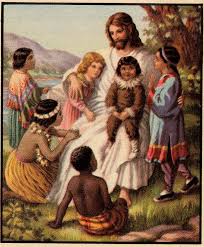
What race was Jesus? How has our perception of His appearance changed over time?
Edward J. Blume and
Paul Harvey's new book
The Color of Christ: The Son of God and the Saga of Race in America deals with such questions.
If asked, most people will acknowledge that Jesus was not the blue-eyed, wavy-haired man of Sunday School fame. Nevertheless, this imagery persists as the most common depiction of Jesus produced by media, and indeed, by churches.
White Jesus readily comes to mind in conversations, and presumably even in moments of prayer or worship. When shown several pictures of Jesus in a variety of ethnicities, Christians "accepted the visual material intellectually, but not emotionally."(p. 251) Indeed "to imagine Jesus as other-than-white would demand a conscious process of unlearning." (p.15)
 |
Jesus is white, because
Google knows everything. |
Often we contradict ourselves in the Church: "we have learned to insist with our denomination that Jesus indeed has no color, that the gospel is colorblind, and that God makes no distinction among people. Yet if we look closely, the Jesus we have embraced is too often a White Jesus." (p. 228)
Images are powerful, and take hold more readily than politically-correct rhetoric and diversity seminars. The authors observe that "civil rights, [and] cultural pluralism...led these whites to change verbally but not materially. The result was that the white Jesus and white privilege were denounced by everyone, but they remained as still-powerful material realities." (p. 250)
Why has this version of Jesus remained so prominent in our collective subconscious? Because "making Jesus visually, and marketing him through the land took time, capital, and freedom. Access to technology and social resources as never been equal and the inequalities have been a factor in what images of Jesus have been created and how they have obtained cultural authority." (p.17) Even those who have given up on white Christians have not always been able to yet relinquished the idea of a white Jesus.
 |
| He sure look white to me... |
If Jesus is white is so many minds, how does the behavior of white folks taint the representation of Him? I'm not sure white folk should want Him associated with their actions. Indeed, from early on in American history, the contradiction has caused many to
reject a God touted by such a cruel race.
Some have been able to accept Jesus, while not adopting his whiteness. There have been many movements to either de-color, or to re-color the Christ. Liberation theologists, among others, have produced Asian Jesus, Chicano Jesus, Yogi Jesus, Black Jesus, and scholars have used forensic archaeology to discern Jesus's 'true appearance.'
 |
| Jesus: white and dreamy |
These depictions have met with significant resistance from a white community too quick to make God in their own image. One of
John Henrik Clarke's stories depicts a boy who is severely reprimanded for painting a picture of a black Jesus, but the boy asserts he did so because Jesus "was so kind and forgiving, kinder than I have ever seen white people be." (p. 220) Almost 25 years later, the movie Dogma noted that "a black man can steal your stereo, but he can't be your savior." (p.274)
Today, the tradition continues. The authors observe that '"new movies and television shows rendered Jesus as white without proclaiming it or defending it. They allowed Americans to adore and cheer a savior in white skin as they professed to believe in a God that did not discriminate." (p. 255)
What are the consequences of the predominant perceptions of a white Jesus? Theologians have noted that "if we accept a White Jesus, if that is the image we see, we have also adopted an image of salvation, of health, wholeness, happiness, that also comes to us via a White culture and comes to us with a White value system." (p. 228) This imagery reinforces the '
white savior complex' and perpetuates the tenancy of white folk to view themselves as morally superior to other groups.
 |
| Diverse children....white Jesus |
Blume and Harvey's scholarly look at the racialized history of the Christ provides an academic and historical perspective on Christian imagery. The book is deliberate as it marches through it's chronicle, but its best strengths are the many stories of individuals who have wrestled with the image of Jesus along the way. Through this lens, we understand that Christ has long been co-opted by those in power, in much the same way that He is used for political gain today.
One is left with a question of what to do with all of their well-researched information. Where do we go from here? And how does this history change our actions today? I suppose these sorts of questions are left to we as the readers to fully examine in our own lives.



